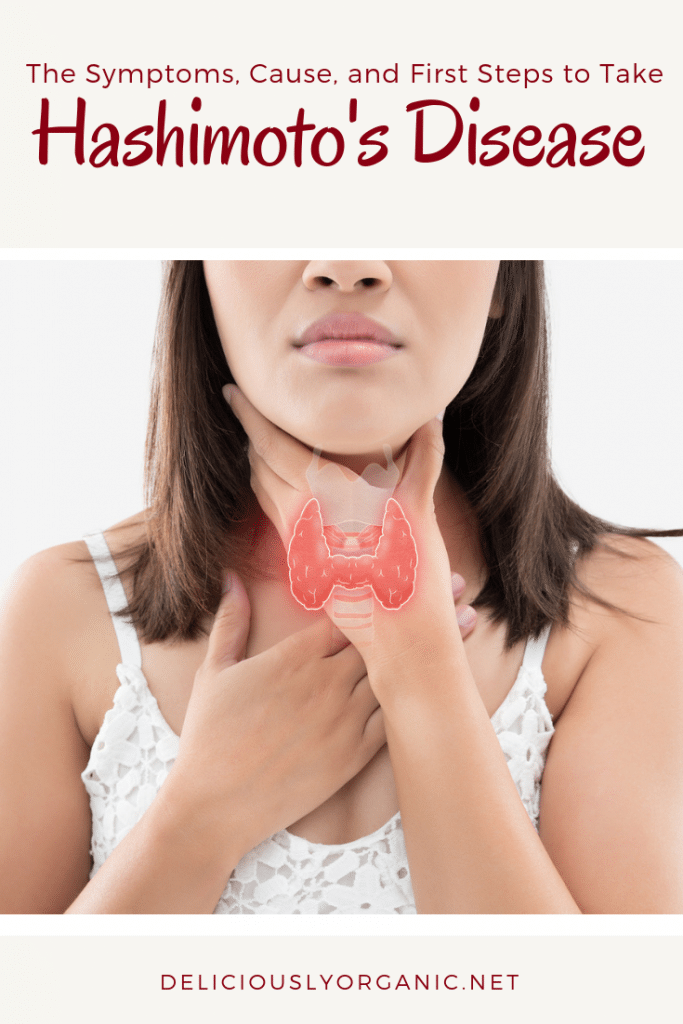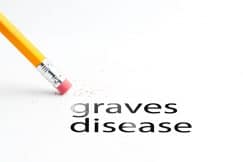Hashimoto’s Disease is a form on thyroid disease that’s rising at an alarming rate, especially in the United States. An estimated 14 million people in the US alone have Hashimoto’s, making it one of the most common forms of thyroid disease.
Today, we’re taking a look at Hashimoto’s from a holistic perspective. So let’s dive in…

What is Hashimoto’s Disease?
Hashimoto’s is an autoimmune condition in which your immune system attacks your thyroid tissues.
Hashimoto’s is most often diagnosed when TPO (thyroid peroxidase) antibodies and/or TgAb (thyroglobulin antibodies) are elevated.
These antibodies can be present even when TSH, T4, T3, FT4 and FT3 levels are normal.
What are TPO antibodies (anti-TPO), and what is a “normal” level?
TPO (thyroid peroxidase) is the key enzyme that helps your thyroid make thyroid hormones. Anti-TPO is an antibody that attacks TPO. This is the lab that is most often used to diagnose Hashimoto’s.
A normal anti-TPO level is usually below 30.
Keep in mind that it’s normal to have a small amount of TPO antibodies in the blood.
What is TgAb and what is a “normal” level?
TgAb (thyroglobulin antibodies), sometimes referred to as TAA (thyroid antithyroglobulin antibody) are antibodies that attack thyroglobulin. Thyroglobulin is a protein produced and used by the thyroid to make T3 and T4.
A normal TgAb level is 0.
What is TSH and what is a “normal” level?
TSH is a hormone that the pituitary sends out to tell the thyroid how much or how little thyroid hormones to produce.
Please note: TSH levels tell you what your pituitary is up to, but it’s not telling you what the thyroid is doing.
When it comes to Hashimoto’s, TSH levels can change a lot, swinging back and forth between hypothyroidism and hyperthyroidism.
Everyone is biochemically individual, but in our practice we’ve found that a TSH level between 0.5-2.0 is the range where people feel healthy and vibrant.
What is free T4 and what is a “normal” level?
Free T4 is a hormone produced by the thyroid.
You want free T4 to be in the middle of the lab range. So if the range is 1.0-3.0, you want your free T4 to be 2 or close to it. Each lab has a different range, so you have to look at what the specific range is to know what number to look for.
What is free T3 and what is a “normal” level?
Free T3 is a hormone that mostly comes from T4. The thyroid makes T4 and sends most of it to the liver to be converted to free T3.
You want free T3 to be in the middle of the lab range. So if the range is 1.0-3.0, you want your free T3 to be 2 or close to it. Each lab has a different range, so you have to look at what the specific range is to know what number to look for.
What are the symptoms of Hashimoto’s Disease?
There are hundreds of symptoms, but here is a list of some of the most common symptoms:
Hypothyroidism
Hyperthyroidism
Depression
Exhaustion
Brain fog
Unexplained or excessive weight gain or loss
Loss of outer third of eyebrows
Dry or coarse hair
Nervousness
Irritability
Increased sweating
Heart racing
Hand tremors
Muscle cramps
Anxiety
Difficulty sleeping
Reduced libido
Hives
Rashes
Anemia
High cholesterol
Constipation
Thinning of your skin
Fine, brittle hair or hair loss
Weakness in your muscles—especially in the upper arms and thighs
More frequent bowel movements
Low Vitamin D
Low B12 or ferritin
Excessive appetite or loss of appetite
Irregular menstrual cycles
Water retention
Lots of energy (often too much)
Why is my TSH too high or too low?
The pituitary, hypothalamus, and adrenals (also called the HPA axis) are all part of the endocrine system and communicate with one another throughout the day. When the body perceives stress, the hypothalamus tells the pituitary to make more or less TSH so that the thyroid will produce more or less thyroid hormones to keep the body functioning.
So, a low or high TSH level isn’t actually a thyroid problem. Instead, it’s often an imbalance in the HPA axis. Your practitioner’s job is now to figure out why there is an imbalance.
Why is my free T4 high or low?
Most often, free T4 is high because there is a severe form of either emotional or environmental stress (from things such as synthetic pesticides, toxic metals, and possibly glyphosate).
Most often, free T4 is low because the thyroid doesn’t have the resources to produce the proper amount of T4. The thyroid needs iodine and tyrosine to produce thyroid hormones. Increasing the consumption of iodine-rich foods, reducing exposure to chlorine, fluoride and bromine (this is incredibly important!), and taking an iodine supplement can often help improve this imbalance.
If you’re concerned about taking iodine when you have thyroid disease, read this post and it should answer your questions.
Free T4 can also be low when antibody levels are elevated. When antibodies attack the thyroid tissues, this can make it difficult for the thyroid to produce enough fT4.
Another common cause of low FT4 is anemia. The body needs iron to make TPO, which is then used to make a thyroid hormone (FT4). When the body is deficient in iron, FT4 levels can drop, putting the body in a hypothyroid state. To read more about this, and see what steps you can take to reverse the issue, click here.
Remember to talk to a nutritionist or health practitioner who’s had lengthy training in nutrition to help you figure out how much iodine or iron your body needs. Self-diagnosing often doesn’t go well, so it’s worth paying a practitioner for their expertise.
Why is my free T3 too high or too low?
Most often, free T3 is high because the thyroid is making too much T4 that is being converted to free T3.
The are three common reasons why free T3 can be low:
1. Free T3 can be low because there isn’t enough free T4 being produced by the thyroid to be converted into free T3.
2. If there are adequate levels of free T4, but there isn’t enough free T3, then this often indicates liver congestion.
Let me explain. . .
Your thyroid produces T4 and sends most of it to the liver to be converted into the active form, free T3. If you have enough free T4, but not enough free T3, then you don’t necessarily have a thyroid problem, instead, you may need to support your liver so it can efficiently convert T4 to T3 for you.
Liver congestion is pretty common nowadays, and can not only cause low T3 in the body, it also can cause estrogen dominance, severe headaches, blood sugar imbalance, chemical sensitivities, skin issues, and dark circles under the eyes, among other things. Here is an article I wrote with specific steps you can take to improve this issue.
3. Free T3 can also be low becuase there is excess cortisol (from adrenal imbalance) that is blocking the conversion of free T4 to free T3 and instead creating an excess of reverse T3.
What are the root causes of Hashimoto’s disease?
There are many different root causes for thyroid autoimmune disease, but here is the basic list (click here for a more comprehensive list):
Stress
Diet
Synthetic chemicals or toxins
Food additives
Heavy metals
Infections
Digestive Issues (intestinal hyperpermeability)
Dental Infections
What steps can you take to improve your symptoms if you’ve been diagnosed with Hashimoto’s Disease?
1. Ask your practitioner for a thyroid panel. Getting a look at what’s actually going on with your thyroid will give you and your practitioner more insight as to what steps to take next.
Here’s the list of labs to ask for (if your doctor won’t order labs for you, you can order them here):
TSH
TPOab
TgAB
Free T3
Free T4
Reverse T3
I also recommend getting a CBC, CMP with phosphorus, lipid panel and Vitamin D.
2. Take steps to improve your digestion. The first way to do this is by eating in a relaxed state and making sure your body is producing enough stomach acid so it can properly break down and utilize the nutrients in your food.
Stomach acid (also known as Hydrochloric acid or HCL) is a necessary part of the digestive process. The acid is our first line of defense against pathogens, bacteria, parasites, etc. It also helps us digest our food properly.
This may sound like a trivial step, but I’ve never seen a client at our practice with Hashimoto’s disease that wasn’t also dealing with low stomach acid. Here’s an article I wrote that explains the steps to take.
Here is an article with my top tips for ways to heal the gut naturally.
3. Take steps to support your adrenals. Why? Because anyone with thyroid disease is also dealing with some kind of adrenal issue. I can’t tell you how many people have taken the steps I list in this article and come back a month or two later telling me how much better they are already feeling!
4. Reduce your sugar intake. Sugar and stress basically do the same thing in the body (minus the calories), so to help balance your TSH and reduce antibodies, you need to watch your sugar intake. If you’ve got massive sugar cravings right now (I’ve been there before!), make this recipe for buttermints and follow the directions listed.
5. Use castor oil packs to gently detoxify the liver and thyroid. Here’s an article I wrote that explains why they are so helpful, lists the supplies you need, and explains exactly how to do one.
6. Remember that your practitioner is working for you, not the other way around. It’s ok to ask them questions about the root cause of what’s going on. If they don’t treat you respectfully when you ask them questions about what’s going on with your body, then it’s ok to find another practitioner to work with. It took me 9 months of going doctor-to-doctor before I found someone who would listen to me and run tests. Being persistent to find the right practitioner to work with pays off!
7. Start moving away from processed foods and eat real, grain-free, nutrient-dense foods. Gluten and grains will only add more inflammation at this point, so it’s very important to remove them from your diet.
When you’re sick, I know this can feel completely overwhelming (I’ve been there!) but removing all gluten and grains from your diet can make a significant difference in your symptoms and antibody levels.
The good news is that I’ve got hundreds healthy recipes here on my site and another 125 in my cookbook, The Grain-Free Family Table. Eating healthy foods will reduce the strain on your body and help bring things back into balance.
One last note – Most people have various root causes, and it can take a while to figure out exactly what they are. This is why I always recommend that my clients first take steps to improve their stress, digestion, liver drainage, and diet. It’s pretty incredible how many symptoms can improve by working on these four main areas of health.
Sometimes, that’s all that’s needed to reduce symptoms and see labs improve, but then there are other times when more testing and additional steps need to be taken. It’s all about baby steps!
If you’d like to learn from first steps you can take to help support your thyroid, check out my class, “3 Keys to Thyroid Hormone Balance”. It’s just 45 minutes and I promise you’ll learn something new!
Disclaimer: The purpose of this post is to give an overview of hashimoto’s from a holistic perspective. Due to biochemical individuality there can be many various reasons for the root causes of thyroid disease, and many ways to help improve thyroid in balance in the body. This information is not intended to take the place of your doctor’s advice.



40 Comments